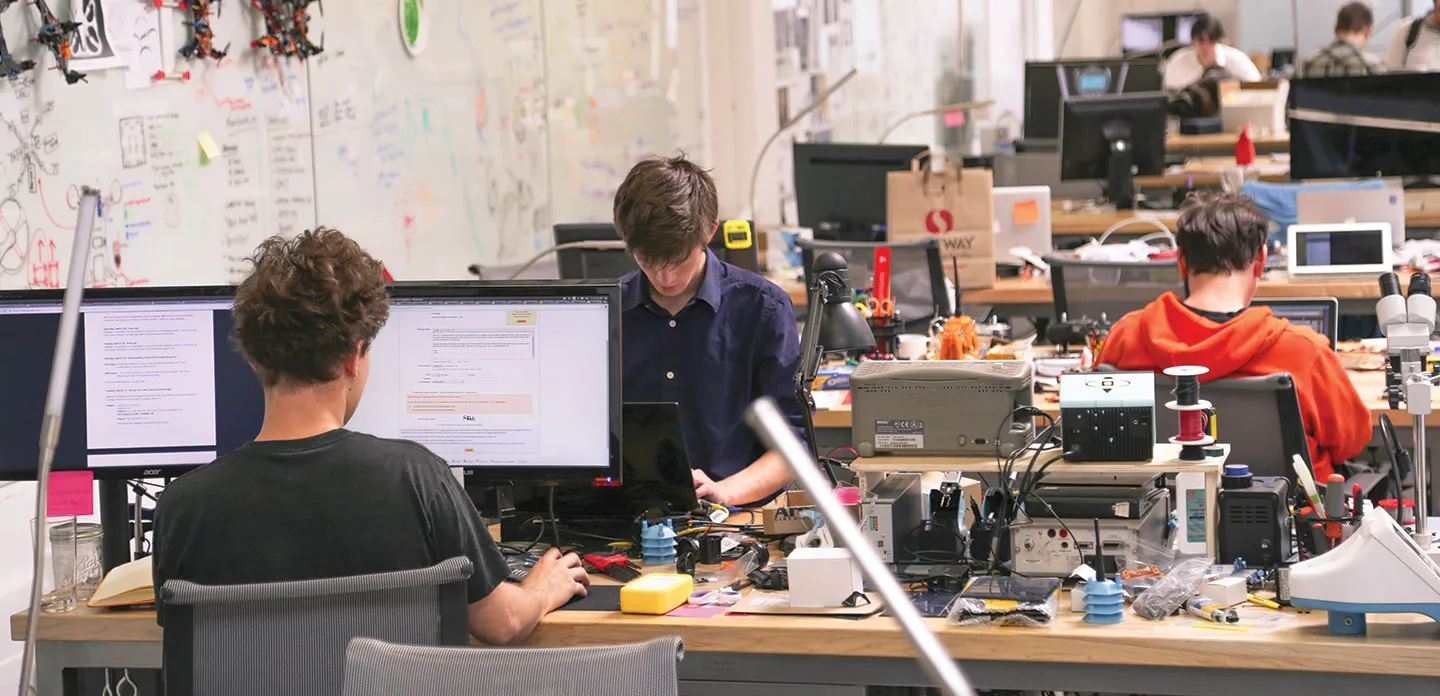Purifying Indoor Air like Never Before
Another Highway1 start-up, Molekule, has developed the world’s first molecular air purifier. For the last half-century, air purification systems relied on high-efficiency particulate air (HEPA) filters, which only trap particles and some biological contaminants in a filter where they continue to live.
Developed by Dr. Yogi Goswami, director of the Clean Technology Department at the University of South Florida and chief science & technology officer of Molekule, the patented photoelectrochemical (PECO) air disinfection technology completely destroys indoor air pollutants, including allergens, bacteria, endotoxins, molds, viruses, and volatile organic compounds, and produces no harmful by-products, only trace amounts of water and carbon dioxide. The technology is effective and scalable, outperforming all available solutions on the market. According to Co-Founder and Chief Operating Officer Jaya Rao, Molekule applied for inclusion in the Highway1 program to accelerate development of a product that will bring the technology to market.
“At Highway1, we made the leap from a proven, functional technology to an aesthetically pleasing, manufacturable product,” says Rao. With master’s degrees in mechanical engineering and public policy from Stanford University, Rao serves in both technical and operational roles at the company. “CAD is my Zen, and we were very glad to get SOLIDWORKS design software. I used SOLIDWORKS at Highway1 to collaborate with an industrial design group, which also uses SOLIDWORKS, to produce a beautiful yet effective design.”
Rao notes that the ability to collaborate with industrial designers on the common SOLIDWORKS design platform supports Molekule’s efforts to accelerate development of a commercially appealing product. “We’ve been working with functional proof-of-concept prototypes with our beta testers to validate performance and gain insights into how we want the final design to look and feel,” Rao stresses. “Now that we’ve gained a better understanding of the user experience, we can use SOLIDWORKS tools to improve the form of the product and address specific details, such as the curvature that we want to employ on a display.”
SOLIDWORKS software facilitates this process because it supports fast design iterations and communications across the Molekule team. “Communication is fundamental to getting to a viable design,” Rao adds. “Whether we’re working with industrial designers or the local machine shop, the ability to visually communicate in 3D with SOLIDWORKS is a key factor in helping us achieve our goal of launching our first product in early 2017.”
Smart Companion to Improve Your Habits
Working at Highway1, MOTI is developing a personable smart companion of the same name that helps users establish, form, and maintain better habits. Founder and CEO Kayla Matheus was inspired to develop the product as a result of her own experiences related to developing exercise habits associated with physical therapy after she tore her ACL. In researching the science of forming good habits (involving triggers, routines, and rewards) and learning that existing products that address this need, such as wearables and smartphone applications, aren’t very effective, Matheus came up with the idea for a standalone device that was simple to operate and that elicited an emotional response.
“I discovered that we’re more Pavlovian than we might think and that developing good habits—like drinking more water, exercising regularly, or flossing daily—requires an environmental cue and emotional reward,” Matheus explains. “Developing a device that supports this process involves a pseudosocial relationship and interactive response. MOTI combines pushing a single button when a task is completed with a celebratory display of light, sound, and haptics, plus long-term relationship-building through the analysis of your habit progress and a suite of additional online features.
“Other products are not very effective because you have to form a habit of using a tool to form a habit—whether it’s charging a battery or finding the right app,” Matheus continues. “Plus, wearables have form limitations, and it’s difficult to have an emotional relationship with a smartphone app. MOTI employs facial and eye imagery and social robotics concepts to make it more effective in helping people maintain the motivation required to develop good habits that last.”
At Highway1, MOTI is leveraging SOLIDWORKS design software to refine the product’s design so that the MOTI’s form and appearance match its emotive, playful manner. While earlier designs were primarily solids-based, Matheus is leveraging SOLIDWORKS surfacing tools in preparation for production. “We’ve done some light surfacing to make the design ready for manufacturing,” Matheus says. “We’ll be utilizing silicone molding in a vacuum chamber, and the mold design and analysis tools in SOLIDWORKS have helped maintain best practices for production, such as draft angles and wall thickness.
“Personally, MOTI motivates me to maintain a regular yoga routine, and SOLIDWORKS software is helping me to give MOTI the design and personality that it needs to be effective,” Matheus adds. “Right now, accelerating development is critically important, and the tools that I have access to in SOLIDWORKS have helped me refine the design and take it into rapid prototyping very quickly.”
